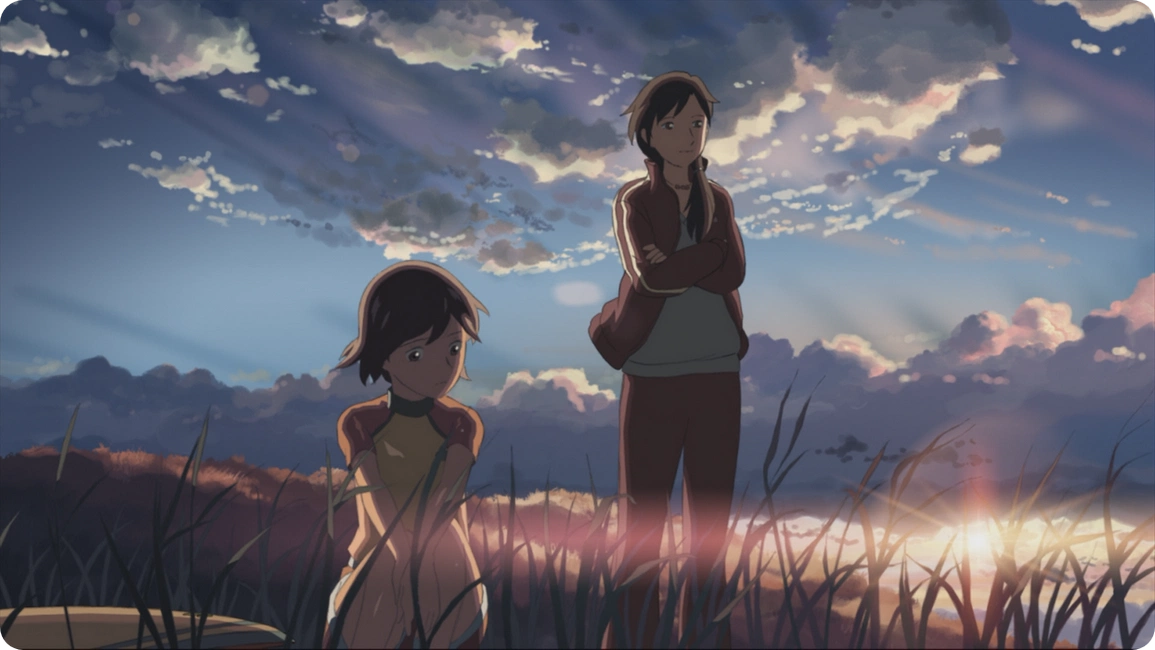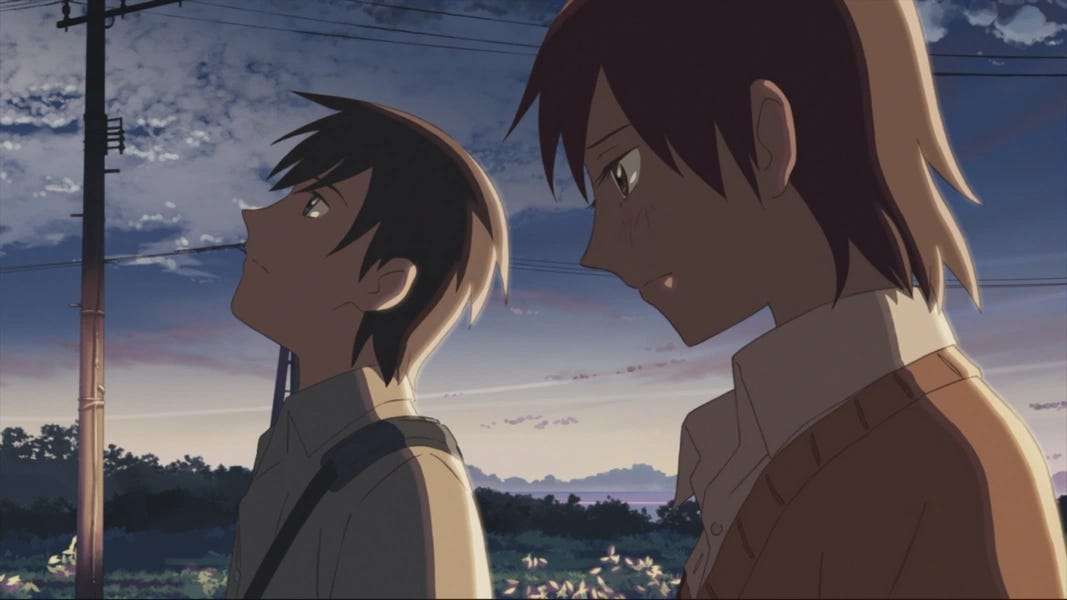Anxiety and the passing of time in 5 Centimeters Per Second, by Makoto Shinkai
Romantic fatalism and falling cherry blossom.
In the beginning of 5 Centimeters Per Second (5CPS), a young girl muses how falling cherry blossom petals look like snowflakes. Snowflakes are more ephemeral than petals, but their fragility is not obvious at this point. Blossom petals fall in Makoto Shinkai's idyllic world and it's easy to remain caught in their beauty as is it to pine for childhood love. This love is often fragile as blossoms - a moment of bliss fading with passing time.
Akari and Takaki wish to see the blossom petals again next year, making a promise to carry them across time and space. But the promise is interrupted by pervading symbolism - a passing train signals the distance between them, planting the seed of doubt. This pinch of anxiety and regret tells a story of romantic fatalism, both sweet and sad in its loss of hope carried by time and circumstances.
The two friends split up after elementary school, while Akari does her best to keep in touch with heartfelt letters. The change is sudden, but the story makes its point in one sickly-sweet and somewhat depressive hour: it's easy to make promises during our best moments, while enraptured by falling blossom. Akari keeps writing, often describing the weather in letters which may seem trite, but her effort in keeping their friendship alive is honest, more obvious than Takaki's.
Seasons pass and time may inevitably efface young love, yet time is not to blame alone - the culprit also stands in the challenge of growing up, the burden of planning your future and the anxiety which different people deal with in different seasons of their lives. Takaki seems to have difficulty communicating back - at this point, it's easy to accuse him of not caring, but the indecision may simply be a sign of anxiety.
There's a strong promise of togetherness in their bonding, not explicitly romantic, but the wistfulness of childhood friendship you think would go on forever. As it often happens, childhood idealism may be fragile, and the friends' attempt to see each other on a beautiful winter day stretches with the same tension arching across the story. The desire to connect with friends and past loves is there in the passing of time, in the space between strangers, but when the moment arrives Takaki seems to retreat. The winter mirrors his anxiety: the snowfall makes the trains late - Takaki is both eager and reluctant to see Akari. Even his promise of writing and calling is a fleeting impulse fading with the parting train.
Their lives move as a disjointed adventure between schools, pedestrian memories, created and scattered among seasons, while Akari makes promises of wanting to reunite, still speaking of the weather. Of the two, she appears the more mature and easier to like. She makes the most effort to communicate and she seems to let go first and continue her life while still loving Takaki.
As expected, romantic tension walks hand in hand with their childhood friendship. As with never-ending camaraderie, the romantic venture doesn't take focus away from their friendship, staying mostly in the realm of the ideal, like a teenage kiss which doesn't need to go further. The kiss happens under a wintry cherry tree, devoid of blossom but waiting to flower again, the sign of a future where friendship and romance will be frayed by time and distance.
Another character joins the story to form an unrealized romantic triangle. Kanae herself may be too similar to Takaki, lacking depth and only obsessing over the male hero. The approach works because, first, no character gets much space for development, and second, she's a mirror and counterpart to Takaki - she loves him, but he remains clueless and pining for Akari.
From Kanae's perspective, Takaki does not know the happiness he forfeits. As Akari, Kanae learns to let go while continuing to love Takaki - like the lonely probe released into cosmos, he will be able to communicate less and less often.
Now, to be fair, 5CPS is a teenage soap opera, touching on anime-style exaggeration of emotions but staying in the realm of the real. Like all soap operas, the story works - effectively - on a simple structure, a set of slightly exaggerated moments where protagonists may be prone to sadness and regret. But it's difficult to fault the plot when this is precisely what it wants - a regretful approach to the idealism of childhood friendship and how time and circumstances can erode said idealism.
The story forces its plot somewhat, as the wintery trains face difficulties in their travels, but the obstacles work as metaphors for anxiety, where unkept promises unravel slowly and their shadow grows until we may lose the courage to communicate. It may seem strange how people who've bonded during their young years may grow to ignore each other or be afraid to speak - but anyone who's experienced the anxiety of growing up and having to decide one's life in a strict manner knows the movie deals with this anxiety naturally, matter-of-factly.
This type of affectation works well with anime, especially with Makoto Shinkai's scenic idealism. It's a pleasure to watch his movies because of the visual poetry he infuses them with. Shinkai knows to translate innocence and idealism into visuals, by drawing beautiful landscapes, exaggerated as the emotions of his protagonists. Watching teenagers be insecure about their future and pining for lost love may not be for everyone, but witnessing the absurd colorful beauty of the sky, summer, sunset, is worth the time regardless of story sensibilities. The stars of the blissful night sky may be indifferent, but they're worth the admiration.
The story gets darker by the end, with young innocence turning into a tedious habit many adults are trapped in. From the idyllic vistas of the previous scenes we see mostly the city towering over Takaki, sometimes watching the sky without a glint of hope. The ending is bittersweet, with Akari now married and Takaki a lonely batchelor. Both watch blossom petals falling, and both think of each other and their younger days.
Sometimes, pointing to the source of anxiety is difficult, and 5 Centimeters Per Second understands it well - the two teenagers don't drift away because of perfect causes, but because the demands of growing up drain away their friendship, eventually ending with the fear or closeness. All this fits into a naturalist anime approach to friendship and anxiety, slightly exaggerated but not unnatural.
We've moved from a teenage fairytale filled with innocence and hope to a modern tale of alienation. Here's the movie's strong point - the inevitability of passing time, young idealism, circumstances which keep loved ones apart until the thread of emotion frays. As an aside, fans of Haruki Murakami's novels may feel at home with Shinkai's realist approach to anxiety.
The portrayal of the move from innocence to boredom is poignant and it may leave some people dispirited. But it's also a reminder on the importance of friendship, on keeping hope and maybe most important, on staying in contact with those you love, adulthood requirements be damned.




